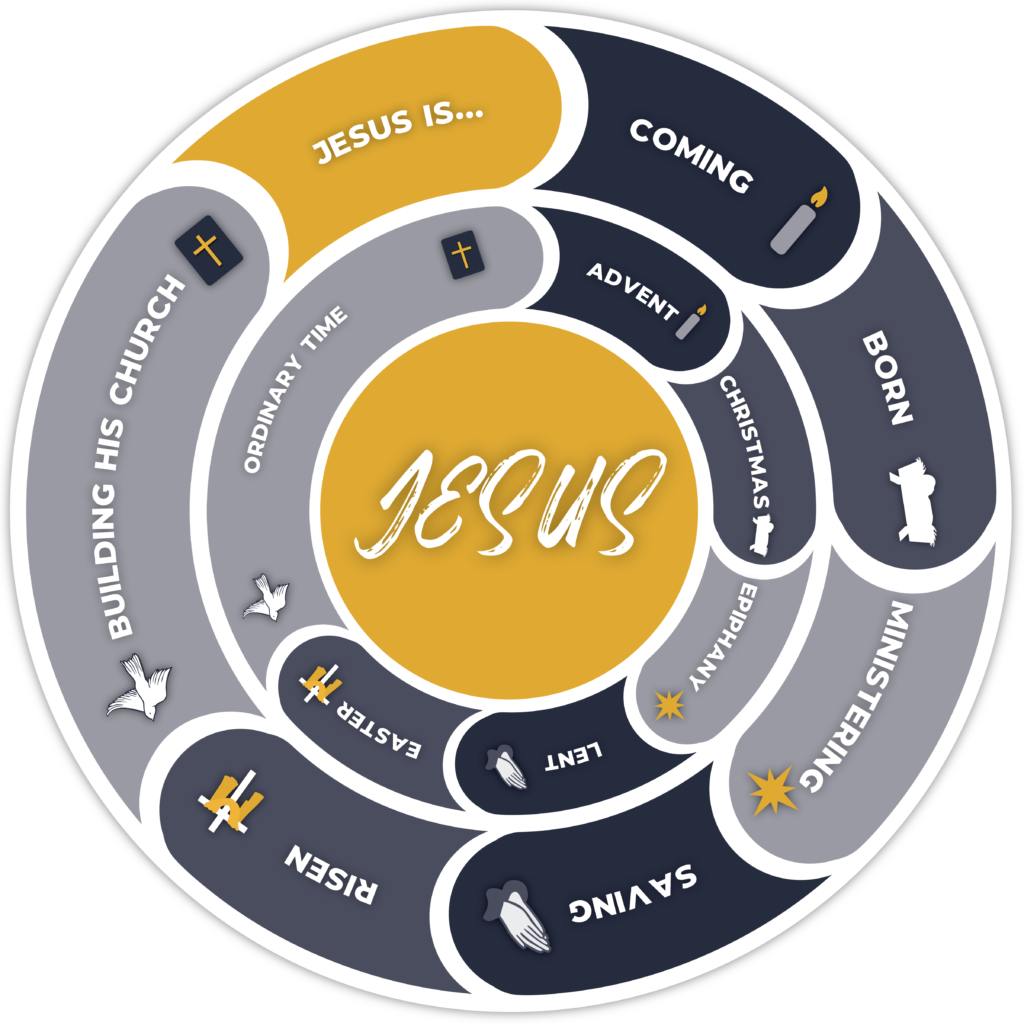Speaking Of Life 3031 | Stopping Where Jesus Stops
We are constantly inundated with notifications and messaging from the world around us.. From our phones to LED billboards, from our smart TVs to our social media platforms, we are constantly distracted. Comparable to what happened in Mark 5, we see that Jesus stops to notice and care for the sick woman amidst the chaotic crowd. Let us follow Jesus’ example and take time to notice those who are lost and sick and love the ones who are hurting.
Speaking Of Life 3031 | Stopping Where Jesus Stops
Greg Williams
In the 1970s, experts posited that we were exposed to 500 to 1,600 advertisements a day. Now the numbers are more like 6,000 to 10,000. And that’s just ads—it doesn’t count the texts, emails, phone calls, and shows we watch.
We are flooded with information in the modern world, and all this at the click of a mouse or touch of a screen. We can experience more entertainment in a few hours than most ancient people encountered over a lifetime.
All of this comes at us so quickly that we ignore much more than we take in and we’ve forgotten how to slow down. And sometimes we need to slow down; sometimes we need to stop and pay attention to a moment.
Throughout His ministry, Jesus showed an amazing ability to stop everything when the moment was right.
A prime example is found in Mark 5.
For she said, “If I touch even his garments, I will be made well.” And immediately the flow of blood dried up, and she felt in her body that she was healed of her disease. And Jesus, perceiving in himself that power had gone out from him, immediately turned about in the crowd and said, “Who touched my garments?”
Mark 5:28-30 (ESV)
In the heat of a desperate crowd, Jesus stops everything to notice someone that no one else saw. This woman was not only chronically ill, but she was also socially and culturally outcast, and yet Jesus stops everything to address her, to call her “daughter”, and to graciously restore her to health.
In other stories, during a hot day In Samaria, he sits by a well to talk with a lonely, rejected woman and has one of the most amazing discussions of revelation in all of scripture. In the bustle and scurry of the temple he pauses to watch a widow give pennies. He took a time out from the crowd of seekers to acknowledge and play with children.
Jesus knew when and how to stop: especially for those who were in the margins and easily ignored—those who no one else stopped for. He shut down everything to share these concentrated, one-on-one conversations.
Do we know how to stop everything like this? Are we in touch enough with Jesus to know when he is calling us to stop?
Think of the elderly person who hasn’t had a complete conversation in weeks. Or the difficult teenager who needs you to explain things yet again. Or your spouse who needs you to share a conversation at the end of a busy day.
This is often where Jesus calls us. Not to just do more stuff, but to stop everything and spend time with someone who needs our time. Are we paying attention? Are we willing to stop? May God help us be aware of those times when we need to stop so we can participate in what he is doing.
I’m Greg Williams, Speaking of Life.
Psalm 130 • 2 Samuel 1:1, 17-27 • 2 Corinthians 8:7-15 • Mark 5:21-43
The theme this week is God the great storyteller. In the call to worship Psalm, the poet connects his comfort in God to Israel’s comfort, weaving his own story into the epic. In 2 Samuel, David mourns Saul, not because the disgraced king was a particularly good man but because he was part of God’s great story of Israel. Mark tells how Jesus entered the sad story of a sickly woman and made her whole. Our sermon discusses 2 Corinthians 8, the transformative story of the Gentile churches financially supporting the Jerusalem church. This healing episode of faith-in-action invites us to see how miraculous the gospel story really is.
Paul’s Bottom Line
2 Corinthians 8:7-15 ESV
Religion has actually convinced people that there’s an invisible man living in the sky who watches everything you do, every minute of every day…. But He loves you. He loves you, and He needs money! He always needs money! He’s all-powerful, all-perfect, all-knowing, and all-wise, somehow just can’t handle money!—George Carlin
With trademark 20th century cynicism, comedian George Carlin describes an issue that many people bring up as a reason to leave the church: “All they ever do is ask for money.” Tithing, which has been part of life in the worshipping community since the dawn of faith, has been a touchy subject since the first time the plate was passed.
Like George Carlin’s caustic remarks, there’s a stereotype of the church as money-hungry and driven by finance more than anything else. Admittedly, some Christians have done plenty to earn this reputation—characters like Jim Bakker and Robert Tilton line the “Halls of Shame” in Christian history. It’s a trite story in which a pastor comes to prominence, then guarantees that people’s tithing will pay big dividends, and then jumps on a plane to a faraway island with his pockets full. It’s a sad reality that we need to acknowledge rather than shy away from. In terms of Christian history, it’s a long, jagged, permanent scar.
And this sticky discussion is squarely the main topic of the end of 2 Corinthians.
Let’s read the text: 2 Corinthians 8:5-17 ESV.
Paul is coordinating a collection—running a capital campaign. Yet unlike the fundraising efforts that we may have seen, or that George Carlin might describe, the details are different. There are no vague promises about God giving them more money back; there is no misdirecting language or bait-and-switch going on; there’s no guilt trips about earning God’s love.
Instead, Paul’s offering is a way to join in the life of God in the world. This gift isn’t a chance to line pockets or re-carpet the sanctuary; it is a dynamic invitation to participate in God’s kingdom coming in the here and now.

Let’s look at Paul’s bottom line, and how what looks like an afterthought in one of his letters is actually a crucial participation in God’s transforming work. We will break this down into three aspects:
- Transformation
- Participation
- Narration
Transformation
But as you excel in everything—in faith, in speech, in knowledge, in all earnestness, and in our love for you—see that you excel in this act of grace also. (2 Corinthians 8:7 ESV)
This “generous undertaking” that Paul describes is more than it may seem on the surface. As described here as well as in Romans 15 and other places, Paul asks his Gentile churches to support the primarily Jewish church in Jerusalem.
Supporting churches across international lines is nothing new for most of us. We might have a “special collection” for an impoverished church on the other side of the world, or a presenter might come to us on a mission-themed week to ask for support. But in Paul’s day, this was something entirely new.
This was a major distinctive of the early church. Religion was everywhere—there were temples and shrines and religious festivals as part of daily life. This was quite different from our modern world in which churches might be everywhere, depending on where you live, but faith is somewhat contained and relegated to the “private” part of life.
The major distinctive, then, was not being religious, even having the unique story that we have in Christ. The Christian world was distinct because it was diverse. Nowhere in the ancient world did they see Jews, Greeks, Macedonians, Romans and all manner of ethnicities in a worshipping, loving community together.
Theologian Tim Mackie describes this:
People had no idea what to do with his communities because the Roman world had never seen such a thing before. In Paul’s day, religion is something you’re born into, it’s completely bound up to the gods of your people group and of your city and of your family. And for people to break that identity and to choose allegiance to a new god and for a Greek and a Macedonian and a Roman and a Jew and a Libyan and an Egyptian and Cyprian to all eat meals together every single Sunday in allegiance to the one true God was absolutely unheard of.
Nobody had seen anything like this before! The Christian community connected people of all backgrounds and walks of life, bringing them together in one family of faith. However, this unifying was not without its issues, and that is what a lot of Paul’s writing is about. In almost every letter, there is a theme of unity—as Christ’s body, as Christ’s temple on earth, as the family of faith—trying to hold together this fledgling body of faith.
One of the major rifts, which Jesus dealt with in his ministry as well, was the rift between the Jewish community and the rest of the world. God’s people were meant to be a blessing to the world, the connection between God’s world and ours, and they had become an insular, scared-of-the-world group that was hostile rather than welcoming; arrogant rather than humble.
This division had carried over into the church. Some of the Jewish Christians demanded their Gentile counterparts to take part in practices made obsolete in Christ. Paul’s rebukes toward this kind of elitism were harsh, to say the least (see Galatians 5:12).
And now Paul asks these Gentile groups to support the Jewish church! That’s transformation! Far more than what might look like just a bit of church housekeeping to us, Paul is telling them to do something revolutionary: support a community that is not only not part of your lineage, but a community that is not so sure they want you as part of theirs. Support them anyway.
Paul calls them toward action. He’s calling them to do more than lip service to this revolutionary unity of people, but to put their money where their mouth is. Not only will they be unified as a church in some abstract way, but this act hits us all where it hurts: Right in the wallet.
Paul’s bottom line is commending the Corinthian church to be part of the transformation of the gospel—bringing about unity where there was division and melting hostility with grace.
Participation
For you know the grace of our Lord Jesus Christ, that though he was rich, yet for your sake he became poor, so that you by his poverty might become rich. (2 Corinthians 8:9 ESV)
One of Jesus’ few direct interactions with a wealthy person is in Matthew 19, when he tells the rich young man to give up all he has and follow Jesus. This is after the man lists out to Jesus how religious he has been—how he’s kept all the commandments from this youth.
One of the demanding aspects that Jesus then lays on him is not another thing for him to do, or another hoop to jump through—Jesus asks him to lack. Ah, there’s the rub. There’s where it hurts. Rather than something else this young man can do, some action he can add to his regimen, Jesus asks him to go without. This man was a religious athlete, a spiritual all-star, and Jesus asks him to do what he would normally seek to avoid—experience weakness.
Paul asks something similar of the Corinthian community. He asks them to participate in giving up something to support a a sister church. He doesn’t ask them to give with some promise of more money coming back their way. He doesn’t ask them to give in a way to earn God’s love or favor.
Paul’s bottom line offers them a chance to participate in the life of God in the world through experiencing emptying, just as Christ did. Jesus stepped into the vulnerable place of giving up himself, knowing that his gift could be forgotten, misused, ignored.
He gave up control and power; he gave up his rights. Paul calls the Corinthian community to take part in this kind of giving up. The bottom line here takes us to an important gospel theme: Jesus acted like us so we could act like like him. He left his throne at the Father’s side to show us that humility is the key to freedom and giving away is the key to true riches. Paul is asking them and us to love as Jesus loves.
In joining in Christ’s work to give up something to support someone else, the Corinthian church wouldn’t be gaining favor or prestige—they would be meeting Jesus. In participating with Jesus, they would know him better.
Narration
This may sound like a strange word for our last point, but what we’re looking at with narration is the sense of the larger story arc of God’s relationship with his favorite creation: us. This epic narrative finds its culmination, its centerpiece, in Jesus.
As modern Christians, we tend to disconnect the two testaments, as if God was a different person before Jesus came along. We don’t see the interlocking parts of the story—the story of Jesus that started with Abraham and even before that.
One of the difficult currents of the early church was the relationship with the past. Jewish factions pressed Gentile converts to practice Hebrew rites; pagan converts balked at restrictions on sexual freedom and other uncomfortable ethical codes. These cultures were two different planets coming together.
Paul touches on this narrative briefly in verse 15:
As it is written, “Whoever gathered much had nothing left over, and whoever gathered little had no lack.” (2 Corinthians 8:15 ESV)
On the first pass, we see that Paul talks about the need for equality in the body of Christ. There is no longer any kind of hierarchy or quid-pro-quo; the family of faith supports each other.
Paul mentions the impoverished community of Macedonia (verses 1-6) participating in this work. He then appeals to Corinth, which was most likely a more wealthy community. These are two ethnic groups with two levels of wealth called to the same work.
Read verse 15 again and you’ll see that Paul quotes Exodus 16, referring to gathering manna in the desert. This was part of the defining narrative for Israel—the Exodus. Paul connects Corinth—pagan, licentious, worldly—with the narrative of Israel! He says the “chosen people” of God are not just one ethnic group, but all people in Christ. He refers to the Israelites centuries before and says, “Corinth, these are your people!”
So, how does Paul’s bottom line speak to us today? What does that mean to us centuries later in a crowded and busy world?
Transformation—Paul called the Corinthians to take action in the transformative work of healing ethnic divisions, something unheard of in the ancient world. There are supernatural transformations like this still happening, often inspired and spearheaded by Christians. Think of the Civil Rights movement in the U.S. that changed history—the vision for this was born in the church. Think of the international unity in the body of Christ and the transformation this shows to the world.
Participation—“I came that they may have life and have it abundantly” (John 10:10). Following Christ is not some way to curry favor with the divine or sweeten the afterlife. It’s the way to fully enter into life, to have it abundantly. Giving to the church or other kingdom causes shouldn’t come from a place of guilt or obligation, but from a desire for the abundant life of knowing Jesus and participating in his kingdom breaking into the world. In humility, we are exalted with him. In being generous along with him, we find true riches and freedom.
Narration—You are part of the epic narrative of God and humanity. As a Christian, the story still flows in your veins. The great heroes you read about in Scripture are your older brothers and sisters who are in the heavenly courts right now. You are as much a part of the story as Moses, Joshua, Paul, Mary—any of these other heroes. There is no one thread in this tapestry that matters more than the others.
Paul called the Corinthians to participate in the life and kingdom of God through this collection for Jerusalem. He knew their gift wouldn’t only result in expanding the church or supporting the poor—their giving would result in them encountering Jesus.
And that, brothers and sisters, is the bottom line.
Questions for sermon: “Paul’s Bottom Line”
- Why do you think there’s a stereotype out there that all the church is after is money? Is that a fair assessment? Have we earned that reputation?
- The sermon talked about the collection for the Jerusalem church as a chance to enter into the life of God and experience a deeper relationship with him. Do you think of tithing as participating in that?
- What are some unhealthy views of tithing? How do we grow toward a healthy attitude and practice of stewardship?
Questions for Speaking of Life: “Stopping Where Jesus Stops”
- We talked about how Jesus stopped for the woman with the issue of blood (Mark 5) and several others. Why do you think he stopped for these outcasts? These “useless” people?
- Why is it hard for us to stop, to slow down and listen?
- Who could Jesus be “stopping for” in our lives? Is there someone he is calling us to stop for? Maybe someone we see every day?
Quote to ponder:
“My piece of bread only belongs to me when I know that everyone else has a share, and that no one starves while I eat.” ~ Leo Tolstoy




 By Bill Hall, National Director, Canada
By Bill Hall, National Director, Canada
 By Heber Ticas, Superintendent, Latin America
By Heber Ticas, Superintendent, Latin America
 By Cara Garrity, Development Coordinator
By Cara Garrity, Development Coordinator
 By Tim Sitterley, U.S. Regional Director West
By Tim Sitterley, U.S. Regional Director West


 prioritize some time to slow down, focus on God, focus on the family and properly order our life around Jesus.
prioritize some time to slow down, focus on God, focus on the family and properly order our life around Jesus.
 “It is so much better to have a team of people working, and serving, and doing ministry together. It is actually more freeing, even though it is scary in the beginning. It is actually more freeing when you a team of people that you trust, you empower, you support, you cheerlead from the sidelines and say, “Go, be the best Avenue Champion you can be!”. There is great joy and excitement in that, once you get past that fear.”
“It is so much better to have a team of people working, and serving, and doing ministry together. It is actually more freeing, even though it is scary in the beginning. It is actually more freeing when you a team of people that you trust, you empower, you support, you cheerlead from the sidelines and say, “Go, be the best Avenue Champion you can be!”. There is great joy and excitement in that, once you get past that fear.”


